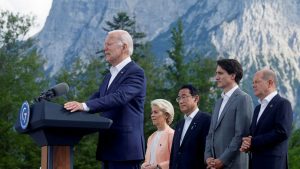
SCHLOSS ELMAU (Munich) In an important step to provide a democratic alternative to counter China’s Belt and Road initiative, the G7 leaders have unveiled $600 billion plan to fund infrastructure projects in low income and middle income countries.
The Partnership for Global Infrastructure and Investment (PGII) will deliver returns for everyone, said US President Joe Biden at the G7 summit meeting at Schloss Elmau, the luxury Alpine resort in Bavaria that is hosting the summit of the world’s wealthiest nations.
“I want to be clear. This isn’t aid or charity. It’s an investment that will deliver returns for everyone,” he said. Mr Biden touted the G7 infrastructure scheme as a showcase “the concrete benefits of partnering with democracies.” The plan envisages raising $600bn over five years to fund the launch of infrastructure projects in middle and low-income countries.

The US has decided to raise $200bn (£162bn) of the amount through grants, federal funds and private investment. The EU has announced a further 300bn euros (£257bn).
The initiative, designed to counter China’s predatory financing, will help tackle tackling climate change, improving global health, achieving gender equity and building digital infrastructure.
The new project seeks to present a “positive powerful investment impulse to the world to show our partners in the developing world that they have a choice,” said European Commission President Ursula von der Leyen.
Author Profile

- Manish Chand is Founder and Editor-in-Chief of India Writes Network (www.indiawrites.org) and India and World, a pioneering magazine focused on international affairs. He is CEO, Centre for Global India Insights, an India-based think tank focused on global affairs.
Latest entries
 India and the WorldFebruary 27, 2026Modi visit: India-Israel partnership enters a new era
India and the WorldFebruary 27, 2026Modi visit: India-Israel partnership enters a new era India and the WorldFebruary 24, 2026Unravelling Modi’s Israel journey: What to expect
India and the WorldFebruary 24, 2026Unravelling Modi’s Israel journey: What to expect India and the WorldFebruary 17, 2026South-by-South: Focus on people-centric solutions at India AI summit
India and the WorldFebruary 17, 2026South-by-South: Focus on people-centric solutions at India AI summit India and the WorldFebruary 7, 2026Modi hails interim India-US trade deal, Goyal says no concessions made on agriculture
India and the WorldFebruary 7, 2026Modi hails interim India-US trade deal, Goyal says no concessions made on agriculture







